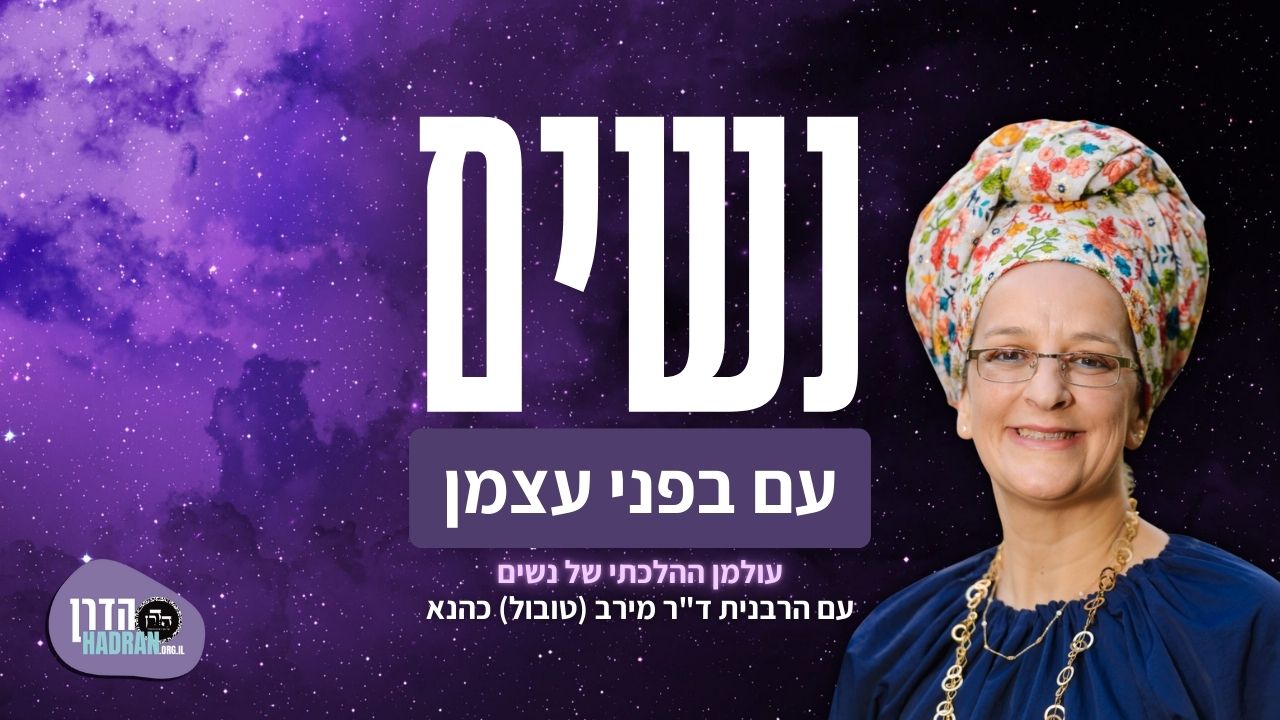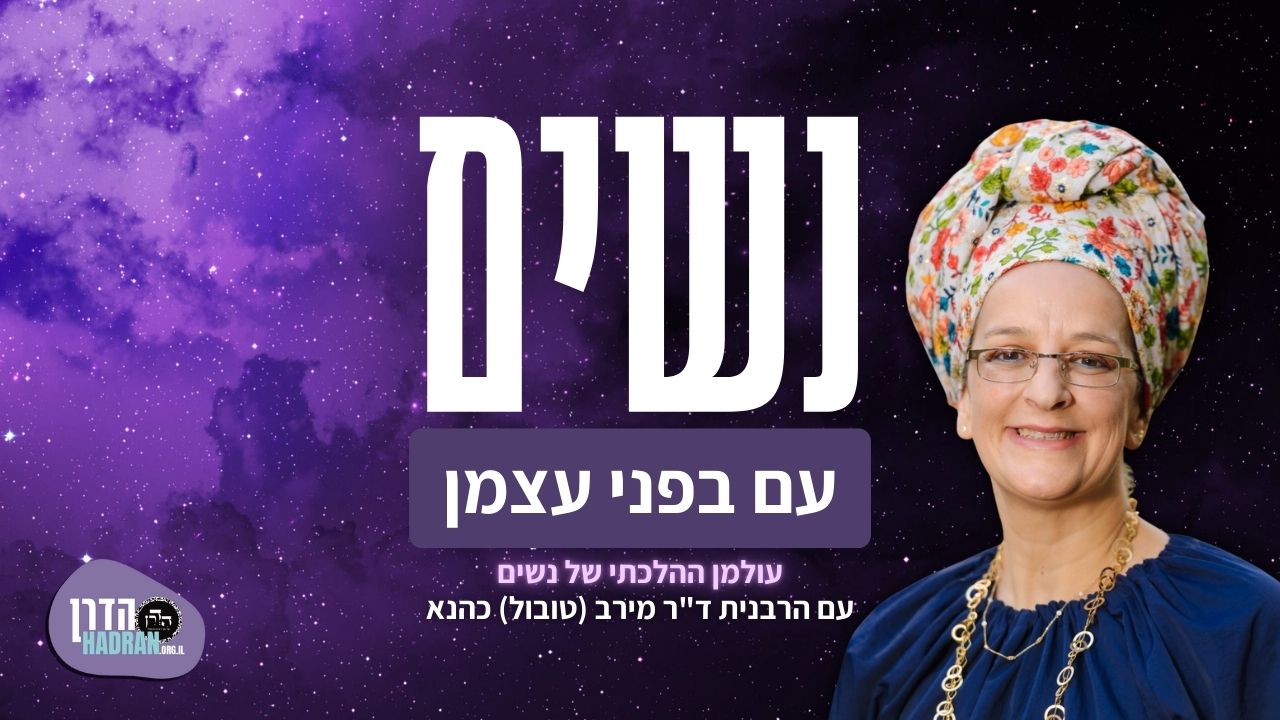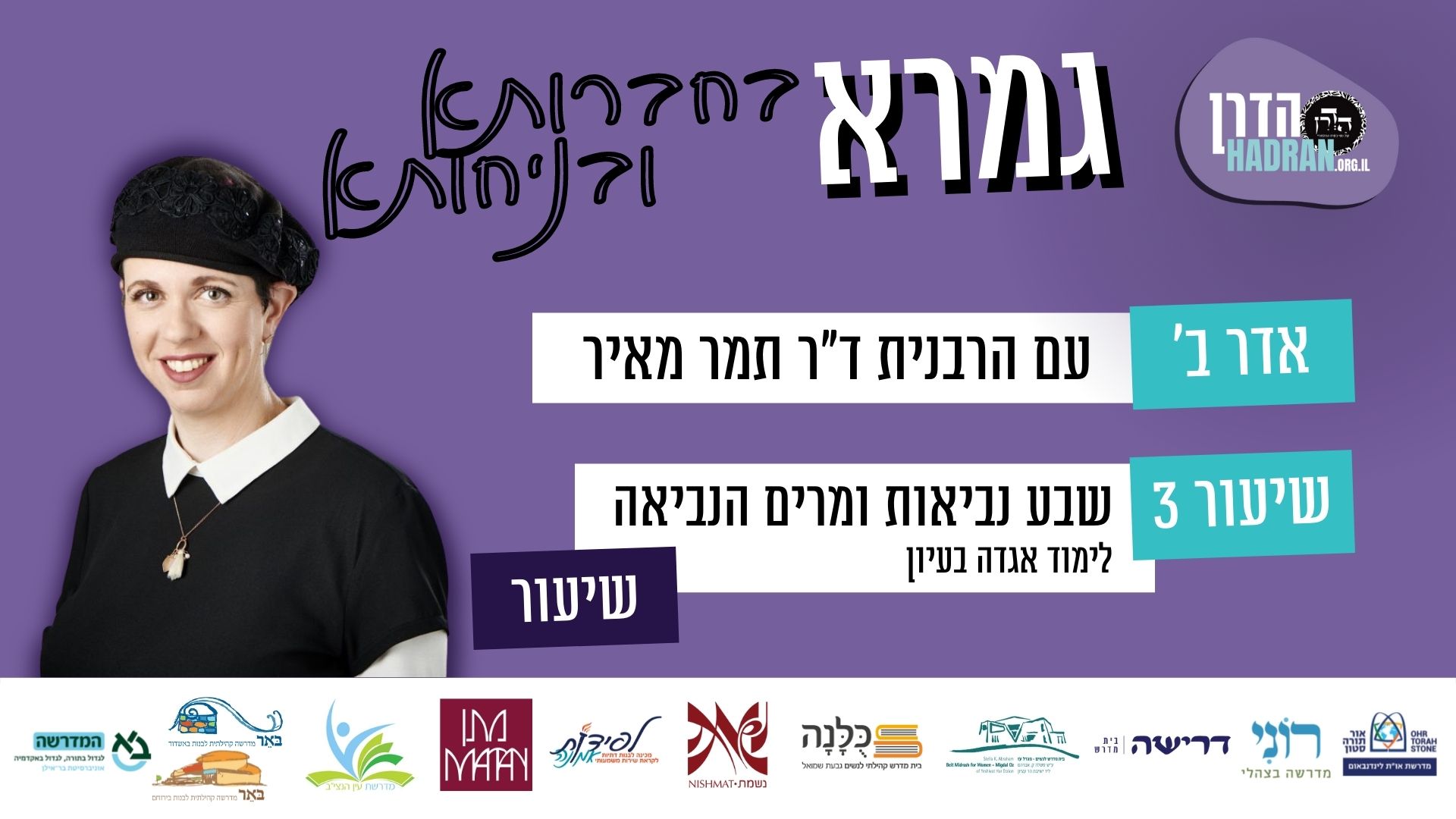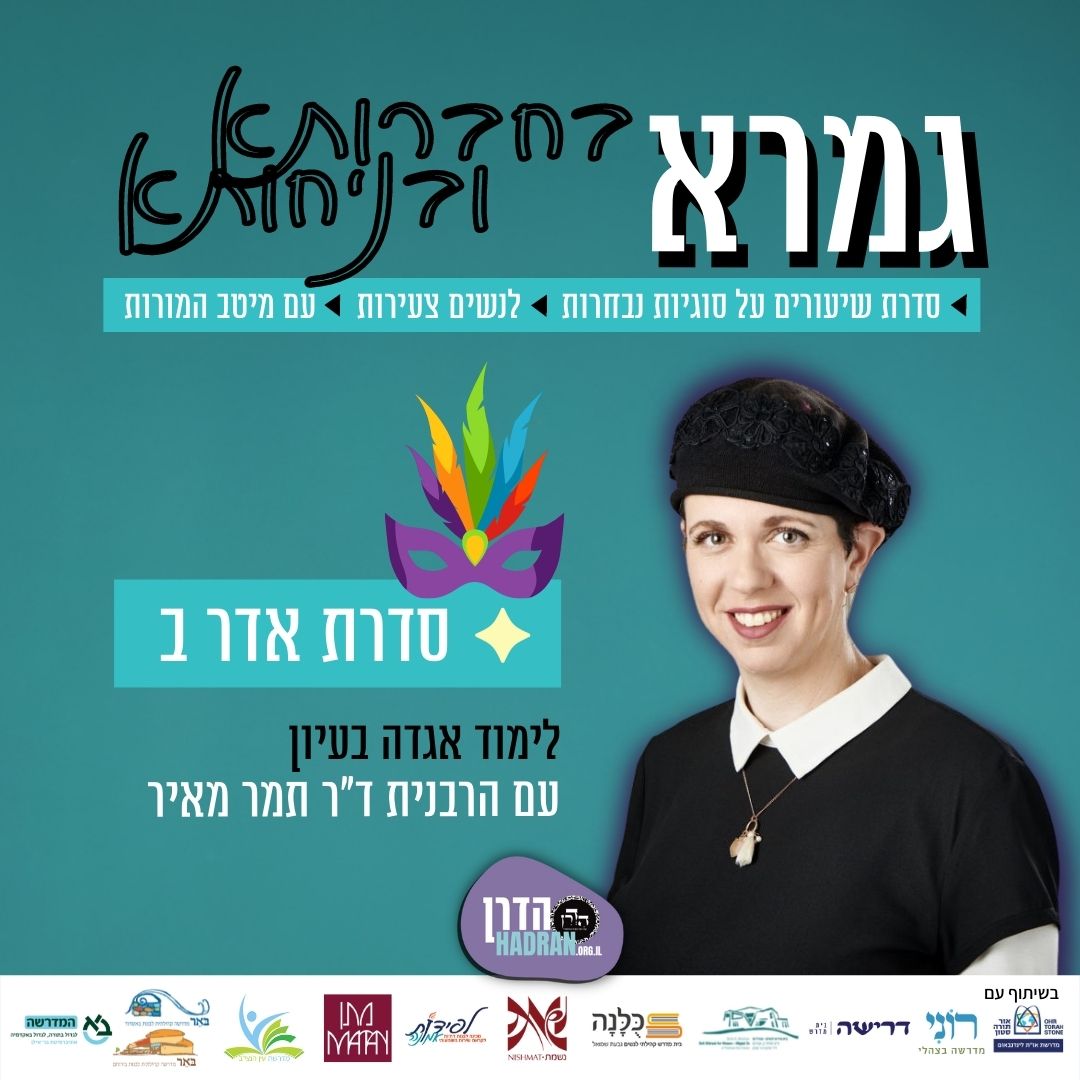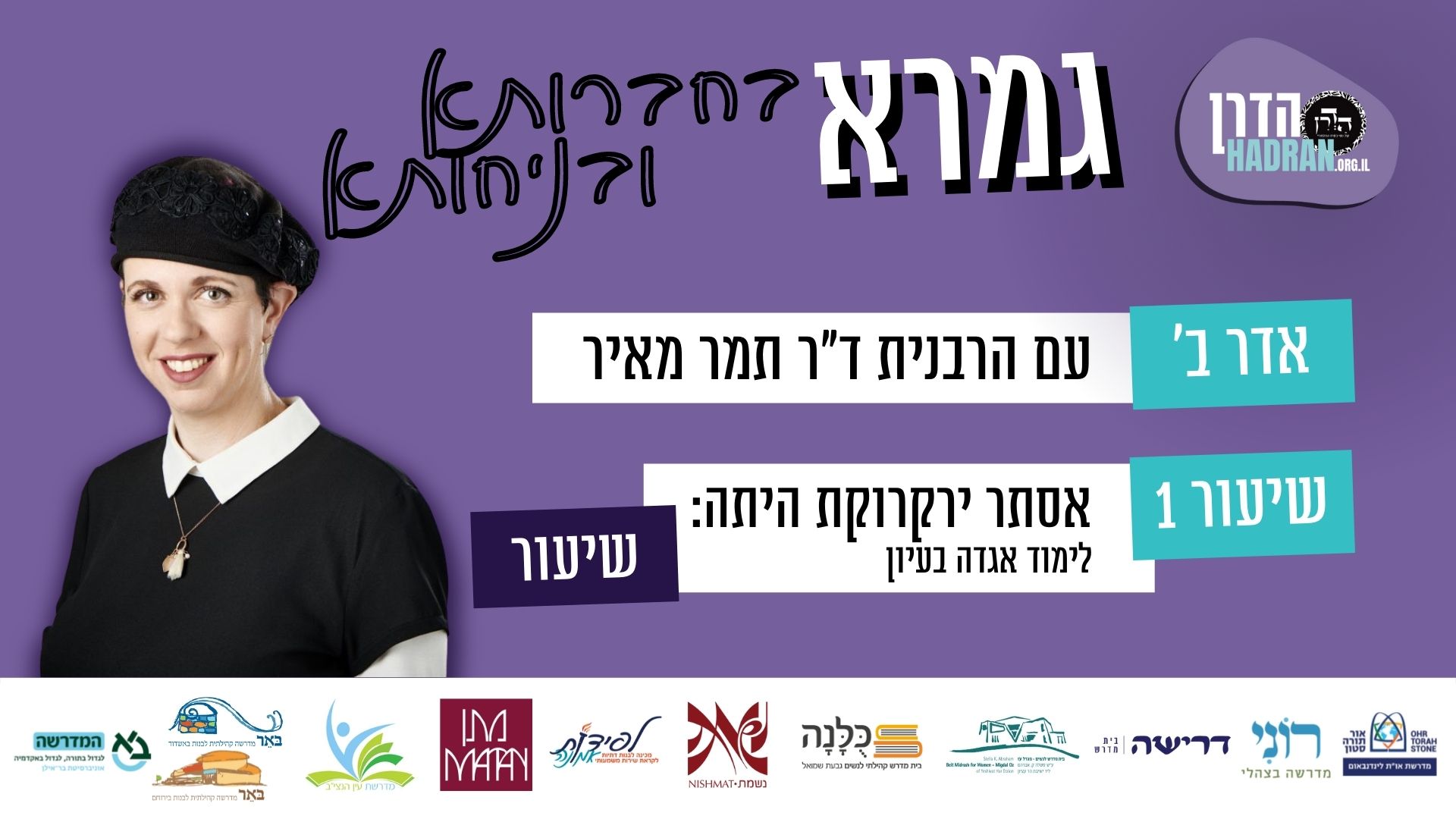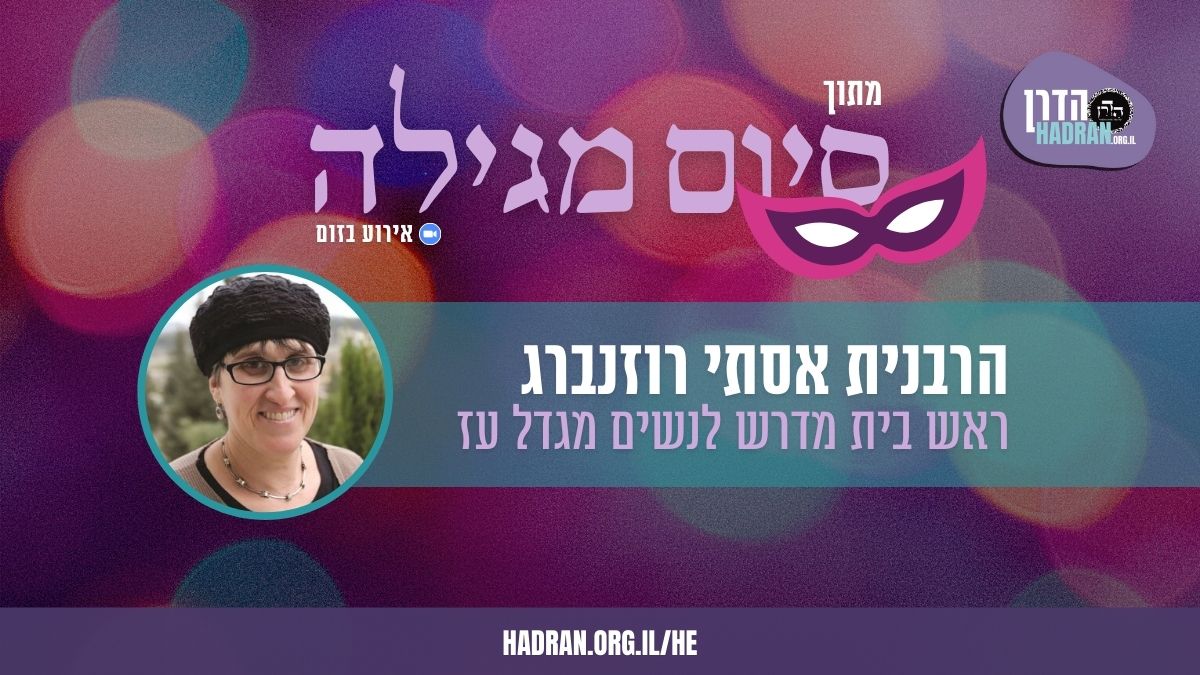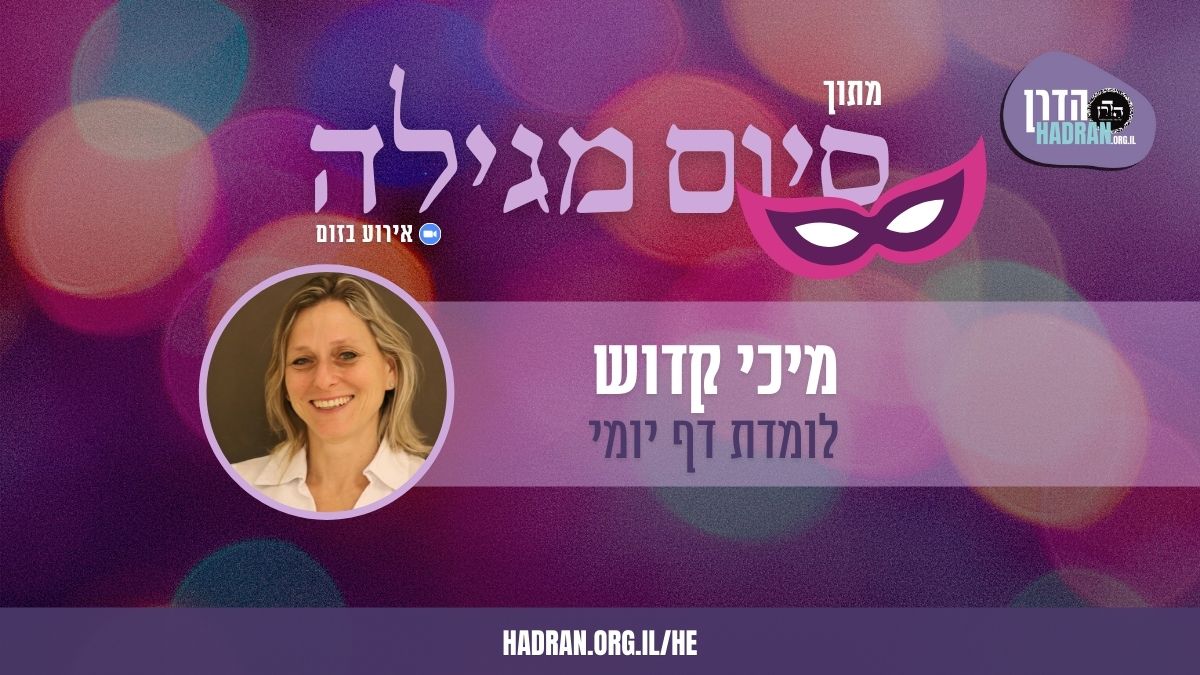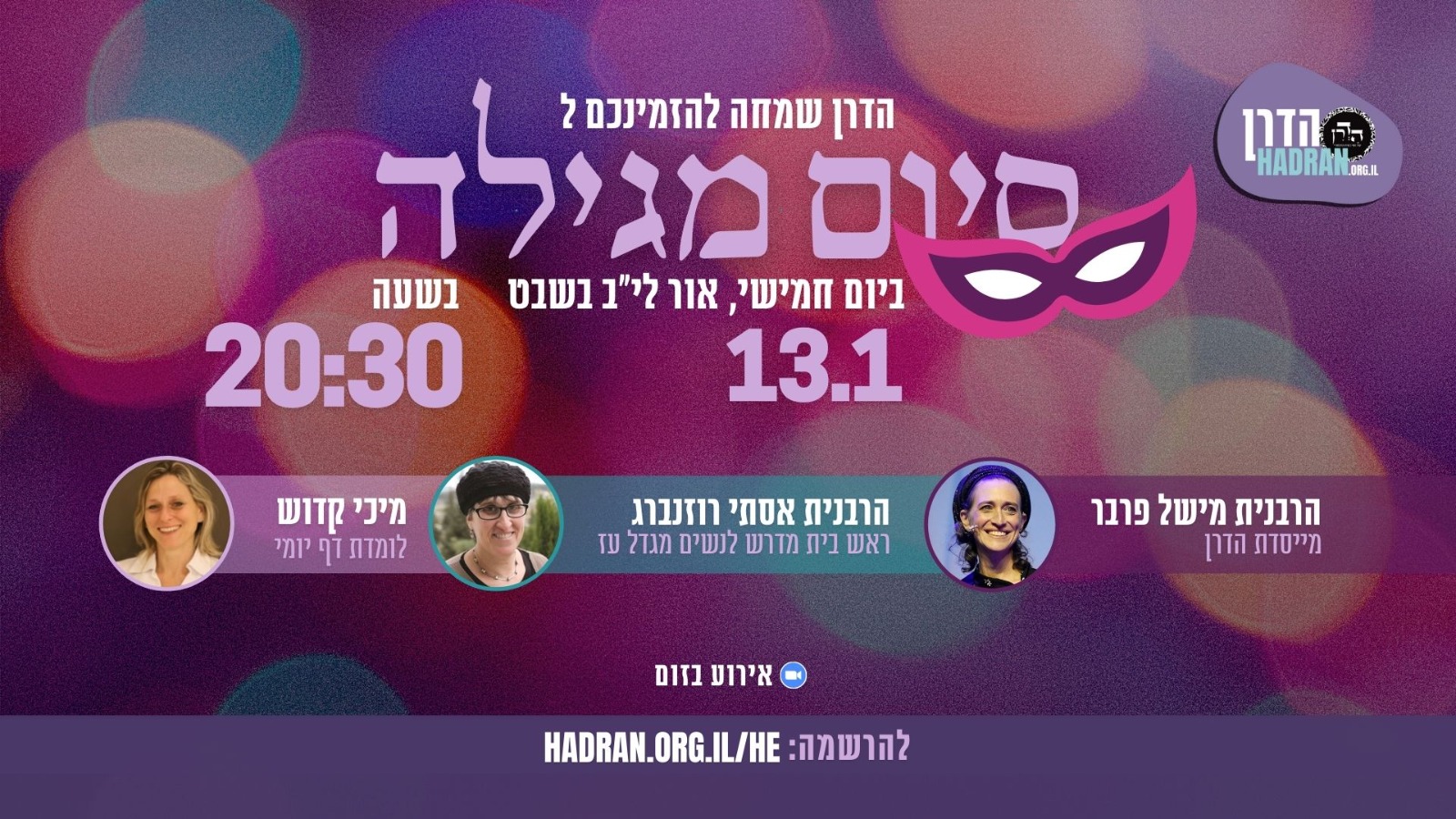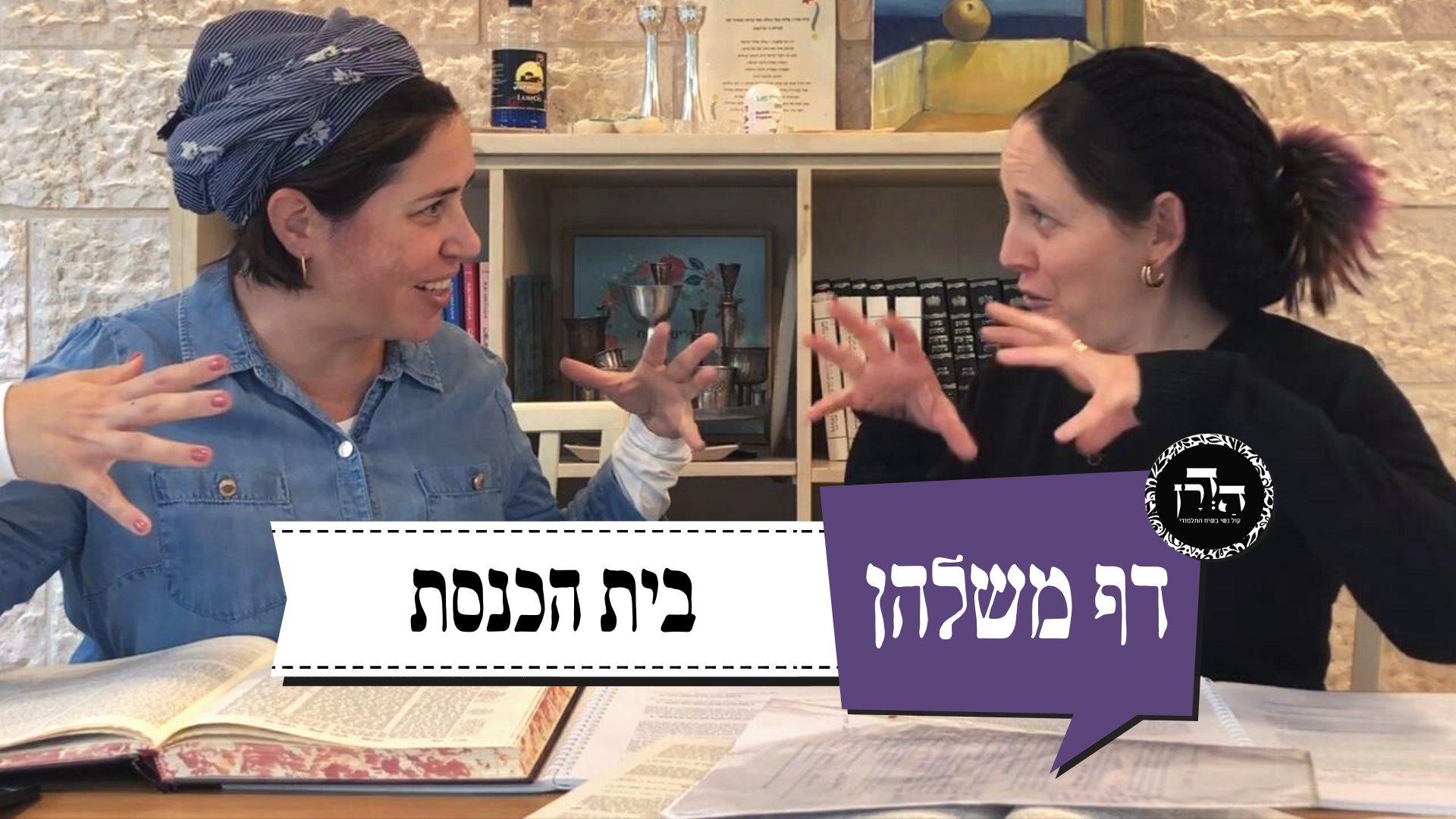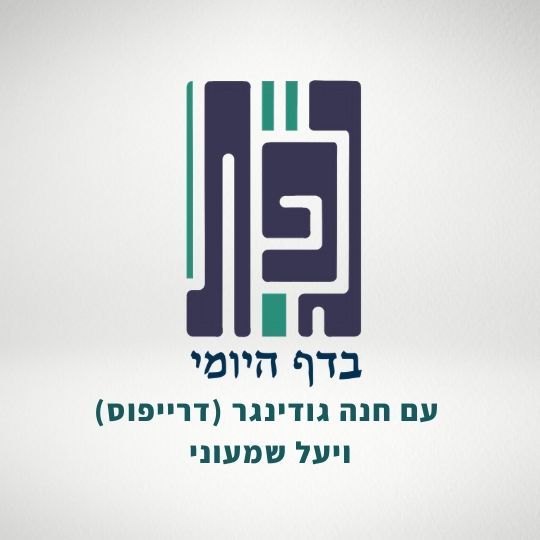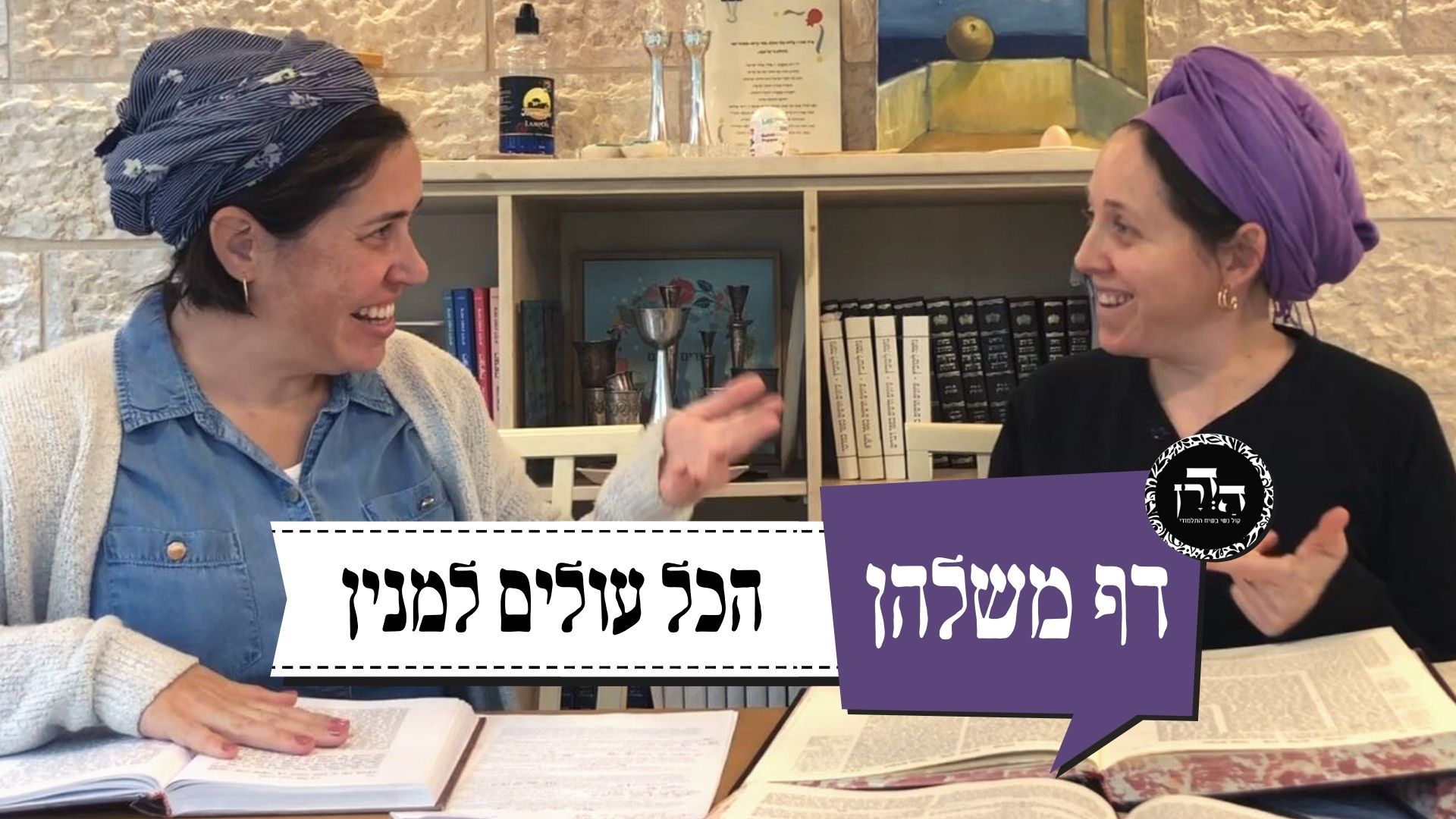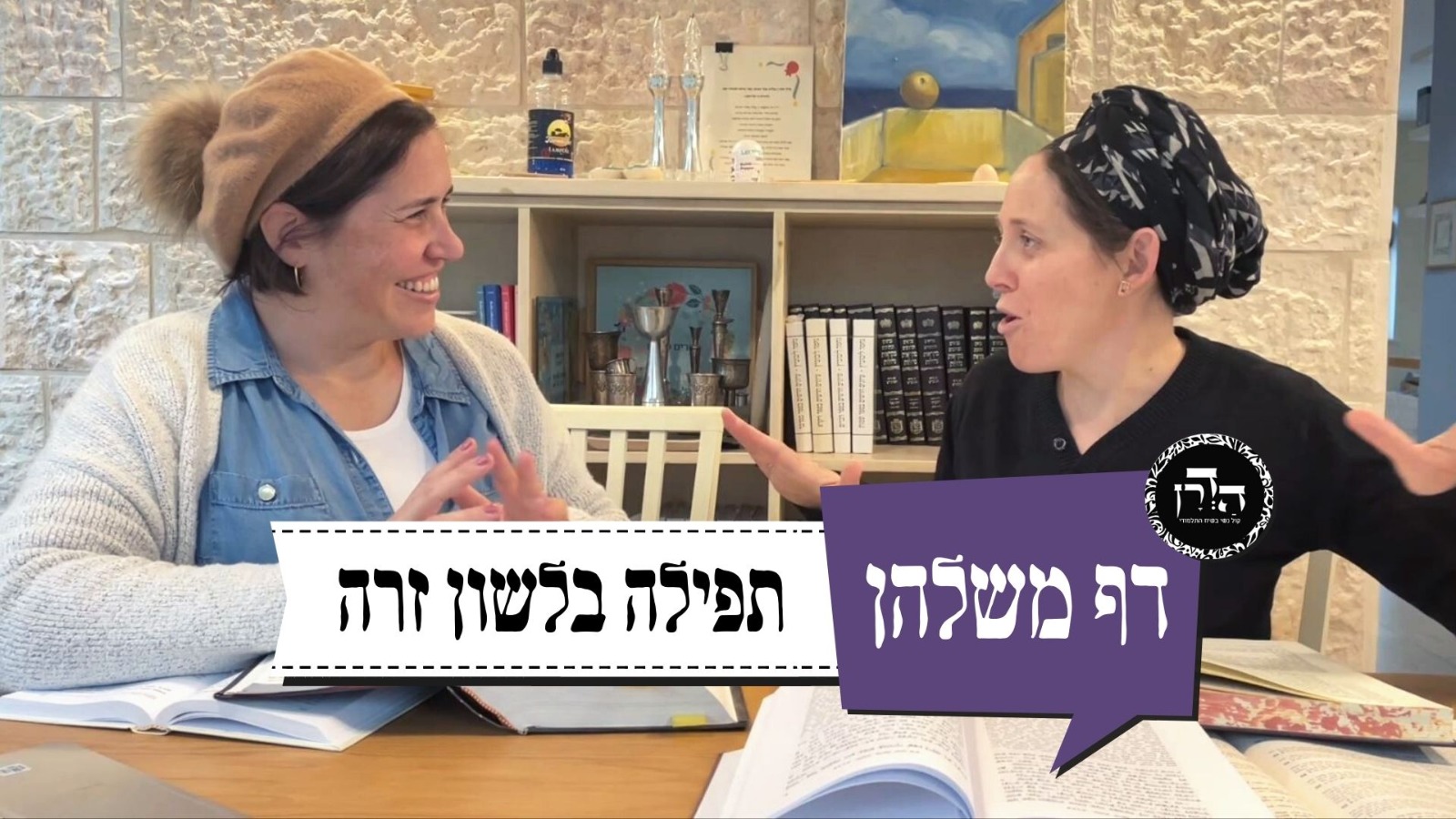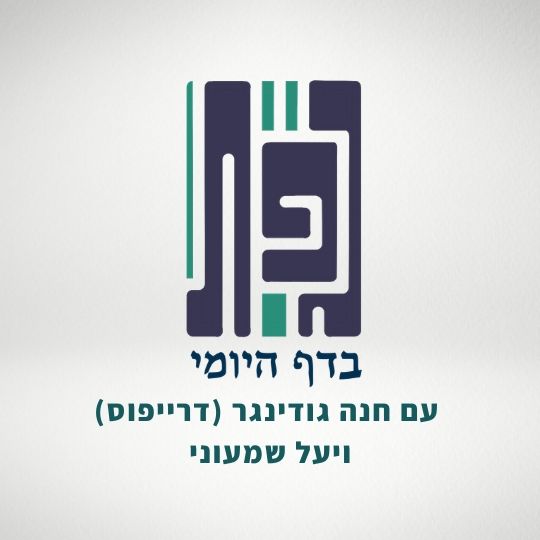מה עושים אם נופלת פרשת שקלים על פרשת תצוה, שמסתיימת בדיוק לפני תחילת פרשת כי תשא, שהיא הקריאה לשקלים לפי שמואל? לאביי ולרבי יצחק נפחא לכל אחד יש פתרונות שונים והגמרא מעלה קושיות נגד כל שיטה וברייתא שתומכת בשיטת אביי. אם ראש חודש אדר חל ביום שישי, רב ושמואל חולקים – האם אנו קוראים את פרשת שקלים בשבת שלפני או בשבת שלאחר מכן. הגמרא מביאה מקורות כדי להקשות/להוכיח את הדעות השונות. יש להם ויכוח דומה לגבי פרשת זכור כאשר פורים חל ביום שישי. מה שורש הוויכוח ביניהם? באילו שבועות קוראים את הפרשיות האחרות? מה נקרא בכל אחד מארבעת השבועות? האם קראו את הפרשיות במקום פרשת השבוע או רק במקום המפטיר וההפטרה? איזו פרשת קוראים בכל אחד מהחגים?
רוצה להקדיש שיעור?
כלים
העמקה
רוצה להבין מה באמת קורה מתחת לפני השטח של הסוגיה?
שיעורים, פודקאסטים והרחבות של מיטב המורות שלנו יפתחו לך עוד זוויות וכיווני חשיבה.
חדשה בלימוד הגמרא?
זה הדף הראשון שלך? איזו התרגשות עצומה! יש לנו בדיוק את התכנים והכלים שיעזרו לך לעשות את הצעדים הראשונים ללמידה בקצב וברמה שלך, כך תוכלי להרגיש בנוח גם בתוך הסוגיות המורכבות ומאתגרות.
פסיפס הלומדות שלנו
גלי את קהילת הלומדות שלנו, מגוון נשים, רקעים וסיפורים. כולן חלק מתנועה ומסע מרגש ועוצמתי.
מגילה ל
אָמְרִי: אוֹקוֹמֵי הוּא דְּקָא מוֹקְמִי הָתָם.
Since Shekalim is read from the portion in the Torah immediately following the regular weekly Torah reading, people will mistakenly say that they merely extended the regular reading and then halted there, and they will not realize that the last reading was actually for the sake of Shekalim.
אֶלָּא אָמַר אַבָּיֵי: קָרוּ שִׁיתָּא מִ״וְּאַתָּה תְּצַוֶּה״ עַד ״וְעָשִׂיתָ״, וְחַד תָּנֵי וְקָרֵי מִ״כִּי תִשָּׂא״ עַד ״וְעָשִׂיתָ״.
Rather, Abaye said: Six people read from “And you shall command” until but not including “And you shall make a copper laver,” which concludes with the portion used for Shekalim. And then one person repeats and reads Shekalim from “When you take the count” until but not including “And you shall make a copper laver.” The repetition of this portion serves to highlight the fact it was read for the sake of Shekalim.
מֵיתִיבִי: חָל לִהְיוֹת בַּפָּרָשָׁה הַסְּמוּכָה לָהּ, בֵּין מִלְּפָנֶיהָ בֵּין מִלְּאַחֲרֶיהָ — קוֹרִין אוֹתָהּ וְכוֹפְלִין אוֹתָהּ.
The Gemara raises an objection from a baraita: If the Shabbat on which Shekalim is to be read occurs on the Shabbat on which the portion to be read for the regular weekly reading is adjacent to Shekalim, whether on the Shabbat preceding that Shabbat or following it, then they read and repeat Shekalim.
בִּשְׁלָמָא לְאַבָּיֵי נִיחָא, אֶלָּא לְרַבִּי יִצְחָק נַפָּחָא קַשְׁיָא!
Granted, according to the opinion of Abaye, it works out well, for the conclusion of the baraita, that we repeat Shekalim, supports his opinion. But according to the opinion of Rabbi Yitzḥak Nappaḥa, it is difficult.
אָמַר לָךְ רַבִּי יִצְחָק נַפָּחָא: וּלְאַבָּיֵי מִי נִיחָא? תִּינַח לְפָנֶיהָ, לְאַחֲרֶיהָ הֵיכִי מַשְׁכַּחַתְּ לַהּ?
The Gemara answers: Rabbi Yitzḥak Nappaḥa could have said to you: And according to Abaye, does it really work out well? The reference of the baraita to a case where the Shabbat on which Shekalim is read precedes the Shabbat on which that portion will be read as part of the weekly reading works out well, since it can indeed occur. However, with regard to the reference to that Shabbat following the Shabbat on which that portion is read as part of the weekly reading, under what circumstances can this case be found? It never occurs like that.
אֶלָּא מַאי אִית לָךְ לְמֵימַר: כּוֹפְלָהּ בְּשַׁבָּתוֹת, הָכָא נָמֵי כּוֹפְלָהּ בְּשַׁבָּתוֹת.
Rather, perforce, what have you to say? That when the baraita refers to repeating Shekalim when the Shabbat on which Shekalim is read follows the Shabbat on which it is read as the regular weekly reading, it means that one repeats it by reading it on two successive Shabbatot. Similarly, here too, when the baraita refers to repeating Shekalim when the Shabbat on which Shekalim is read precedes the Shabbat on which it is read as the regular weekly reading, it means that one repeats it by reading it on two successive Shabbatot.
חָל לִהְיוֹת בְּ״כִי תִשָּׂא״ עַצְמָהּ, אָמַר רַבִּי יִצְחָק נַפָּחָא: קָרוּ שִׁיתָּא מִן ״וְעָשִׂיתָ״ עַד ״וַיַּקְהֵל״, וְחַד קָרֵי מִ״כִּי תִשָּׂא״ עַד ״וְעָשִׂיתָ״.
The Gemara considers a similar case: If the Shabbat on which Shekalim is to be read occurs on the Shabbat on which the regular portion itself begins with “When you take the count,” what should be done? Rabbi Yitzḥak Nappaḥa said: Six people read from “And you shall make a copper laver” until but not including the portion of “And he assembled” (Exodus 30:17–34:35). This is the entire regular weekly portion of “When you take the count” without the opening passage, which is also the portion of Shekalim. And then one person goes back and reads the portion of Shekalim from “When you take the count” until but not including “And you shall make a copper laver.”
מַתְקֵיף לַהּ אַבָּיֵי: הַשְׁתָּא אָמְרִי לְמַפְרֵעַ הוּא דְּקָרֵי! אֶלָּא אָמַר אַבָּיֵי: קָרוּ שִׁיתָּא עַד ״וַיַּקְהֵל״, וְחַד תָּנֵי וְקָרֵי מִ״כִּי תִשָּׂא״ עַד ״וְעָשִׂיתָ״.
Abaye strongly objects to this: Now people will mistakenly say that they are reading the regular weekly portion out of sequence, and they will not realize that the last reading was actually for the sake of the portion of Shekalim. Rather, Abaye said: Six people read the entire portion of “When you take the count” until but not including the portion of “And he assembled” (Exodus 30:11–34:35), and then one person repeats and reads the portion of Shekalim from “When you take the count” until but not including “And you shall make a copper laver.”
תַּנְיָא כְּווֹתֵיהּ דְּאַבָּיֵי: חָל לִהְיוֹת בְּ״כִי תִשָּׂא״ עַצְמָהּ — קוֹרִין אוֹתָהּ וְכוֹפְלִין אוֹתָהּ.
The Gemara notes: It is taught in a baraita in accordance with the opinion of Abaye: If the Shabbat on which Shekalim is to be read occurs on the Shabbat on which the regular portion itself is “When you take the count,” the first part of that portion is read once as part of the weekly reading and then repeated as the portion of Shekalim.
חָל לִהְיוֹת בְּתוֹךְ הַשַּׁבָּת — מַקְדִּימִין לַשַּׁבָּת שֶׁעָבְרָה. אִיתְּמַר: רֹאשׁ חֹדֶשׁ אֲדָר שֶׁחָל לִהְיוֹת בְּעֶרֶב שַׁבָּת, רַב אָמַר: מַקְדִּימִין, וּשְׁמוּאֵל אָמַר: מְאַחֲרִין.
§ The mishna states: If the New Moon of Adar occurs during the middle of the week, the congregation advances the reading of Shekalim to the previous week. With regard to this, an amoraic dispute was stated: With regard to when the New Moon of Adar occurs on Friday, Rav said: The congregation advances the reading of the portion to the previous week. And Shmuel said: They defer the reading of the portion to the following day, and it is read on the coming Shabbat.
רַב אָמַר מַקְדִּימִין — דְּאִם כֵּן בָּצְרִי לְהוּ יוֹמֵי שׁוּלְחָנוֹת. וּשְׁמוּאֵל אָמַר מְאַחֲרִין — אָמַר לָךְ: סוֹף סוֹף חֲמֵיסַר בְּמַעֲלֵי שַׁבְּתָא מִיקְּלַע, וְשׁוּלְחָנוֹת לָא נָפְקִי עַד חַד בְּשַׁבָּא, הִלְכָּךְ מְאַחֲרִין.
The Gemara explains the two opinions: Rav said: They advance the reading to the previous week, as, if one would read the portion only on the following day, there will be less than the required number of days, i.e., two weeks, that the announcement needs to precede the setting up of the money-changing tables on the fifteenth. And Shmuel said: They defer the reading of the portion to the following day. As for Rav’s argument, Shmuel could have said to you: Ultimately, in such a year the fifteenth of Adar also occurs on a Friday, and therefore the money-changing tables will not be brought out until Sunday. Consequently, there will still be a full two weeks between the announcement and the setting of the tables. Therefore, they can defer the reading to the following day.
תְּנַן: חָל לִהְיוֹת בְּתוֹךְ הַשַּׁבָּת — מַקְדִּימִין לְשֶׁעָבַר, וּמַפְסִיקִין לְשַׁבָּת אַחֶרֶת. מַאי לָאו אֲפִילּוּ בְּעֶרֶב שַׁבָּת? לֹא, בְּתוֹךְ הַשַּׁבָּת דַּוְקָא.
The Gemara offers various proofs for Rav’s opinion: We learned in the mishna: If the New Moon occurs during the middle of the week, they advance the reading of that portion to the previous Shabbat, and in such a case they interrupt the reading of the four portions on the following Shabbat. The Gemara explains the proof: What; is it not that this is referring even to a case when the New Moon occurs on Friday? This would prove Rav’s opinion. No; it is referring specifically to a case where it occurs during the middle of the week.
תָּא שְׁמַע: אֵיזוֹ הִיא שַׁבָּת רִאשׁוֹנָה — כׇּל שֶׁחָל רֹאשׁ חֹדֶשׁ אֲדָר לִהְיוֹת בְּתוֹכָהּ, וַאֲפִילּוּ בְּעֶרֶב שַׁבָּת. מַאי לָאו: אֲפִילּוּ בְּעֶרֶב שַׁבָּת — דּוּמְיָא דְּתוֹכָהּ, מָה תּוֹכָהּ מַקְדִּימִין — אַף עֶרֶב שַׁבָּת מַקְדִּימִין!
Come and hear another proof from a baraita: Which is the first Shabbat of the four Shabbatot on which the special portions are read? The Shabbat of whichever week during which the New Moon of Adar occurs, and this is the case even if it occurs on Friday. The Gemara explains the proof: What, is it not that the baraita teaches that the case when it occurs even on Friday is similar to the case where it occurs during the middle of the week, and just as when it occurs during the middle of the week, they advance the reading to the previous Shabbat, so too, when it occurs on Friday, they advance the reading to the previous Shabbat? This would therefore prove Rav’s opinion.
אָמַר שְׁמוּאֵל: בָּהּ. וְכֵן תָּנָא דְּבֵי שְׁמוּאֵל: בָּהּ.
Shmuel said: The baraita should be emended, and instead of saying: During which the New Moon occurs, it should say: On which the New Moon occurs, i.e., on Shabbat itself. And so the school of Shmuel taught: On which the New Moon occurs.
כְּתַנָּאֵי: מְסָרְגִין לְשַׁבָּתוֹת, דִּבְרֵי רַבִּי יְהוּדָה הַנָּשִׂיא. רַבִּי שִׁמְעוֹן בֶּן אֶלְעָזָר אוֹמֵר: אֵין מְסָרְגִין. אָמַר רַבִּי שִׁמְעוֹן בֶּן אֶלְעָזָר: אֵימָתַי אֲנִי אוֹמֵר אֵין מְסָרְגִין — בִּזְמַן שֶׁחָל לִהְיוֹת בְּעֶרֶב שַׁבָּת, אֲבָל בִּזְמַן שֶׁחָל לִהְיוֹת בְּתוֹךְ הַשַּׁבָּת — מַקְדִּים וְקוֹרֵא מִשַּׁבָּת שֶׁעָבְרָה, אַף עַל פִּי שֶׁהוּא שְׁבָט.
The Gemara suggests: This dispute between the amora’im is like a dispute between tanna’im, as it is taught in a baraita: With regard to the reading of the four special portions, they interrupt the flow of Shabbatot, i.e., there is a Shabbat in which no special portion is read; this is the statement of Rabbi Yehuda HaNasi. Rabbi Shimon ben Elazar said: They do not interrupt the flow of Shabbatot. Rabbi Shimon ben Elazar said: When do I say that they do not interrupt the flow of Shabbatot? When the New Moon of Adar occurs on Friday, since I hold that in that case Shekalim is read on the following day, and therefore the four portions are read on four consecutive weeks. However, when the New Moon of Adar occurs during the week, one advances and reads Shekalim on the previous Shabbat, although it is still the month of Shevat, and therefore on one of the Shabbatot in Adar there will be no reading. It would appear, then, that Shmuel holds in accordance with the opinion of Rabbi Shimon ben Elazar, whereas Rav holds in accordance with the opinion of Rabbi Yehuda HaNasi.
בִּשְׁנִיָּיה ״זָכוֹר״ וְכוּ׳. אִיתְּמַר: פּוּרִים שֶׁחָל לִהְיוֹת בְּעֶרֶב שַׁבָּת, רַב אָמַר: מַקְדִּימִין פָּרָשַׁת זָכוֹר, וּשְׁמוּאֵל אָמַר: מְאַחֲרִין.
§ The mishna states: On the second Shabbat of Adar, the Shabbat prior to Purim, they read the portion of “Remember [zakhor] what Amalek did” (Deuteronomy 25:17–19). The portion of Zakhor is associated with Purim because according to tradition, Haman was a descendant of Amalek, and so the victory over him and his supporters was a victory against Amalek. With regard to this, an amoraic dispute was stated: With regard to when Purim occurs on a Friday, Rav said: The congregation advances the reading of the portion of Zakhor to the previous Shabbat. And Shmuel said: They defer it to the Shabbat following Purim.
רַב אָמַר מַקְדִּימִין — כִּי הֵיכִי דְּלָא תִּיקְדּוֹם עֲשִׂיָּה לִזְכִירָה. וּשְׁמוּאֵל אָמַר מְאַחֲרִין — אָמַר לָךְ: כֵּיוָן דְּאִיכָּא מוּקָּפִין דְּעָבְדִי בַּחֲמֵיסַר, עֲשִׂיָּה וּזְכִירָה בַּהֲדֵי הֲדָדֵי קָא אָתְיָין.
The Gemara explains the two opinions: Rav said: They advance it to the previous Shabbat, in order that the observance of Purim should not precede the remembrance of the destruction of Amalek, which is achieved through reading the portion of Zakhor. And Shmuel said: They defer its reading. And as for Rav’s argument, Shmuel could have said to you: Since there are the walled cities that observe Purim on the fifteenth, at least with regard to them, the observance and the remembrance come together on the same day, and that is sufficient.
תְּנַן: בַּשְּׁנִיָּה ״זָכוֹר״. וְהָא כִּי מִיקְּלַע רֵישׁ יַרְחָא בְּשַׁבָּת, מִיקְּלַע פּוּרִים בְּעֶרֶב שַׁבָּת, וְקָתָנֵי בַּשְּׁנִיָּה ״זָכוֹר״! אָמַר רַב פָּפָּא: מַאי שְׁנִיָּה — שְׁנִיָּה לְהַפְסָקָה.
The Gemara offers various proofs for Rav’s opinion: We learned in the mishna: On the second Shabbat they read the portion of Zakhor. The Gemara suggests: Is it not the case that when the New Moon of Adar occurs on Shabbat, Purim occurs on Friday, and yet the mishna teaches: On the second Shabbat they read the portion of Zakhor? This supports Rav’s opinion that in all cases the portion is read before Purim. Rav Pappa said: There is no proof, because one could argue as follows: What is the intention of the mishna when it is referring to the second Shabbat? It could mean the second Shabbat on which a special portion is read, which, if Purim occurs on Friday, occurs only after the interruption of the previous Shabbat, during which no portion was read.
תָּא שְׁמַע: אֵיזוֹ שַׁבָּת שְׁנִיָּה — כׇּל שֶׁחָל פּוּרִים לִהְיוֹת בְּתוֹכָהּ, וַאֲפִילּוּ בְּעֶרֶב שַׁבָּת. מַאי לָאו: עֶרֶב שַׁבָּת — דּוּמְיָא דְּתוֹכָהּ, מָה תּוֹכָהּ מַקְדִּימִין — אַף עֶרֶב שַׁבָּת מַקְדִּימִין!
Come and hear another proof from a baraita: Which is the second Shabbat on which a special portion is read? The Shabbat of whichever week during which Purim occurs, and this is the case even if it occurs on Friday. The Gemara explains the proof: What, is it not that the baraita teaches that even if Purim occurs on Friday, the case is similar to the case when it occurs during the middle of the week, and therefore, just as when it occurs during the middle of the week we advance the reading to the previous Shabbat, so too, when it occurs on Friday, we should advance the reading to the previous Shabbat? This baraita would therefore prove Rav’s opinion.
אָמַר שְׁמוּאֵל: בָּהּ. וְכֵן תָּנָא דְּבֵי שְׁמוּאֵל: בָּהּ.
Shmuel said: The baraita should be emended, and instead of saying: During which Purim occurs, it should say: On which Purim occurs, i.e., on Shabbat itself. And so the school of Shmuel taught: On which Purim occurs.
חָל לִהְיוֹת בְּשַׁבָּת עַצְמָהּ, אָמַר רַב הוּנָא: לְדִבְרֵי הַכֹּל אֵין מַקְדִּימִין. וְרַב נַחְמָן אָמַר: עֲדַיִין הִיא מַחְלוֹקֶת. אִיתְּמַר נָמֵי, אָמַר רַבִּי חִיָּיא בַּר אַבָּא, אָמַר רַבִּי אַבָּא אָמַר רַב: פּוּרִים שֶׁחָל לִהְיוֹת בְּשַׁבָּת — מַקְדִּים וְקוֹרֵא בַּשַּׁבָּת שֶׁעָבְרָה ״זָכוֹר״.
With regard to when Purim occurs on Shabbat itself, Rav Huna said: Everyone agrees, i.e., both Rav and Shmuel, that they do not advance the reading of the portion of Zakhor to the previous Shabbat, but it is read on that Shabbat. And Rav Naḥman said: Even in this case there is still a dispute, for Rav maintains that in all cases the remembrance of the destruction of Amalek, which is achieved through reading the portion of Zakhor, must always precede the observance of Purim. It was also stated that Rabbi Ḥiyya bar Abba said that Rabbi Abba said that Rav said: If Purim occurs on Shabbat, one advances and reads the portion of Zakhor on the previous Shabbat, as Rav Naḥman understood Rav’s opinion.
בַּשְּׁלִישִׁית פָּרָה אֲדוּמָּה וְכוּ׳. תָּנוּ רַבָּנַן: אֵיזוֹ הִיא שַׁבָּת שְׁלִישִׁית — כֹּל שֶׁסְּמוּכָה לְפוּרִים מֵאַחֲרֶיהָ. אִיתְּמַר, רַבִּי חָמָא בְּרַבִּי חֲנִינָא אָמַר: שַׁבָּת הַסְּמוּכָה לְרֹאשׁ חֹדֶשׁ נִיסָן.
§ The mishna states: On the third Shabbat, they read the portion of the Red Heifer [Para] (Numbers 19:1–22). The Sages taught in a baraita: Which is the third Shabbat? Whichever Shabbat occurs immediately after Purim. It was also stated: Rabbi Ḥama, son of Rabbi Ḥanina, said: The Shabbat that is immediately before the New Moon of Nisan.
וְלָא פְּלִיגִי: הָא דְּאִיקְּלַע רֹאשׁ חֹדֶשׁ נִיסָן בְּשַׁבָּת, הָא דְּאִיקְּלַע בְּאֶמְצַע שַׁבָּת.
The Gemara comments: And these two statements do not disagree, as they refer to different cases: This statement of Rabbi Ḥama, son of Rabbi Ḥanina, is referring to a case where the New Moon of Nisan occurs on Shabbat itself. In that case, the portion of HaḤodesh is read then, and therefore the portion of Para is read on the preceding Shabbat. And that statement of the baraita is referring to a case where the New Moon of Nisan occurs during the middle of the week. Therefore, HaḤodesh is read on the Shabbat immediately preceding the New Moon, and Para is read on the Shabbat before that one, which is the Shabbat that is adjacent to Purim and after it.
בָּרְבִיעִית ״הַחֹדֶשׁ הַזֶּה לָכֶם״. תָּנוּ רַבָּנַן: רֹאשׁ חֹדֶשׁ אֲדָר שֶׁחָל לִהְיוֹת בַּשַּׁבָּת — קוֹרִין ״כִּי תִשָּׂא״, וּמַפְטִירִין בִּ״יהוֹיָדָע״. וְאִי זוֹ הִיא שַׁבָּת רִאשׁוֹנָה — כֹּל שֶׁחָל רֹאשׁ חֹדֶשׁ אֲדָר לִהְיוֹת בְּתוֹכָהּ, וַאֲפִילּוּ בְּעֶרֶב שַׁבָּת. בַּשְּׁנִיָּה ״זָכוֹר״, וּמַפְטִירִין ״פָּקַדְתִּי״. וְאִי זוֹ הִיא שַׁבָּת שְׁנִיָּה — כֹּל שֶׁחָל פּוּרִים לִהְיוֹת בְּתוֹכָהּ, וַאֲפִילּוּ בְּעֶרֶב שַׁבָּת.
§ The mishna states: On the fourth Shabbat, they read the portion of “This month [haḥodesh] shall be for you” (Exodus 12:1–20). The Sages taught in a baraita: When the New Moon of Adar occurs on Shabbat, they read “When you take the count” as the portion of Shekalim. And they read as the haftara the story involving Jehoiada the priest (II Kings 12:1–27). And which is the first Shabbat? The Shabbat of whichever week during which the New Moon of Adar occurs, and this is the case even if it occurs on Friday. On the second Shabbat, they read the portion of Zakhor, and they read as the haftara of “I remembered that which Amalek did” (I Samuel 15:1–34). And which is the second Shabbat? The Shabbat of whichever week during which Purim occurs, and this is the case even if it occurs on Friday.
בַּשְּׁלִישִׁית פָּרָה אֲדוּמָּה, וּמַפְטִירִין ״וְזָרַקְתִּי עֲלֵיכֶם״. וְאֵי זוֹ הִיא שַׁבָּת שְׁלִישִׁית — כֹּל שֶׁסְּמוּכָה לְפוּרִים מֵאַחֲרֶיהָ. בָּרְבִיעִית הַחֹדֶשׁ הַזֶּה, וּמַפְטִירִין ״כֹּה אָמַר ה׳ [אֱלֹהִים] בָּרִאשׁוֹן בְּאֶחָד לַחֹדֶשׁ״.
On the third Shabbat, they read the portion of the Red Heifer [Para], and they read as the haftara the portion of “Then will I sprinkle clean water upon you” (Ezekiel 36:25–38). And which is the third Shabbat? That which is adjacent to Purim and after it. On the fourth Shabbat, they read the portion of “This month [haḥodesh] shall be for you,” and they read as the haftara the portion of “Thus says the Lord God: In the first month, on the first day of the month” (Ezekiel 45:18–46:18).
וְאֵיזוֹ הִיא שַׁבָּת רְבִיעִית — כֹּל שֶׁחָל רֹאשׁ חֹדֶשׁ נִיסָן לִהְיוֹת בְּתוֹכָהּ, וַאֲפִילּוּ בְּעֶרֶב שַׁבָּת.
And which is the fourth Shabbat? The Shabbat of whichever week during which the New Moon of Nisan occurs, and this is the case even if it occurs on Friday.
בַּחֲמִישִׁית חוֹזְרִין לִכְסִדְרָן וְכוּ׳. לְסֵדֶר מַאי? רַבִּי אַמֵּי אָמַר: לְסֵדֶר פָּרָשִׁיּוֹת הוּא חוֹזֵר. רַבִּי יִרְמְיָה אָמַר: לְסֵדֶר הַפְטָרוֹת הוּא חוֹזֵר.
§ The mishna states: On the fifth Shabbat, we resume the regular weekly order. The Gemara clarifies the mishna’s intent: To the order of what does one resume? Rabbi Ami said: One resumes the regular weekly order of Torah portions. Rabbi Ami holds that on the weeks on which the special portions are read, the regular weekly Torah portion is not read at all, and therefore the cycle is resumed only on the fifth Shabbat. Rabbi Yirmeya said: One resumes the regular weekly order of the haftarot. Rabbi Yirmeya holds that even on the Shabbatot on which the special portions are read, the regular weekly portion is still read; the special portion is read by the last reader as the maftir. However, the haftara of the regular cycle is entirely replaced with a portion from the Prophets that parallels the special portion. As such, it is the cycle of haftarot that is resumed on the fifth Shabbat.
אָמַר אַבָּיֵי: כְּווֹתֵיהּ דְּרַבִּי אַמֵּי מִסְתַּבְּרָא, דִּתְנַן: לַכֹּל מַפְסִיקִין, לְרָאשֵׁי חֳדָשִׁים, לַחֲנוּכָּה, וּלְפוּרִים, לְתַעֲנִיּוֹת, וּלְמַעֲמָדוֹת, וּלְיוֹם הַכִּפּוּרִים.
Abaye said: It stands to reason that one should rule in accordance with the opinion of Rabbi Ami, as we learned in the mishna: For all special days, we interrupt the regular order of readings, and a special portion relating to the character of the day is read. This applies to the New Moons, to Hanukkah, and to Purim, to fast days, and to non-priestly watches, and to Yom Kippur.
בִּשְׁלָמָא לְמַאן דְּאָמַר: לְסֵדֶר פָּרָשִׁיּוֹת הוּא חוֹזֵר — הַיְינוּ דְּאִיכָּא פָּרָשָׁה בְּחוֹל. אֶלָּא לְמַאן דְּאָמַר: לְסֵדֶר הַפְטָרוֹת הוּא חוֹזֵר — הַפְטָרָה בְּחוֹל מִי אִיכָּא?
Abaye explains his proof: Granted, according to the one who said that one resumes the regular weekly order of Torah portions, this statement in the mishna is referring to the fact that there is a reading of the weekly Torah portion on weekdays. If one of the special days listed in the mishna occurs on Monday or Thursday, the weekly Torah reading is replaced by the special portion for that day. However, according to one who said that one resumes the regular weekly order of haftarot, what could the mishna mean when it says that the regular cycle is interrupted? Is there a haftara on weekdays? The mishna therefore supports Rabbi Ami’s opinion.
וְאִידַּךְ — הָא כִּדְאִיתָא וְהָא כִּדְאִיתָא.
And the other one, Rabbi Yirmeya, would counter: This case is as it is, and that case is as it is. On days when there is a haftara, the reference in the mishna is to the order of the haftarot. On weekdays, when there is no haftara, the reference is to the order of the Torah readings. Therefore, no proof can be deduced from the mishna.
וּבְתַעֲנִיּוֹת לְמָה לִי הַפְסָקָה? לִיקְרֵי מִצַּפְרָא בְּעִנְיָנָא דְיוֹמָא, וּבְמִנְחָה בְּתַעֲנִיתָא! מְסַיַּיע לֵיהּ לְרַב הוּנָא, דְּאָמַר רַב הוּנָא: מִצַּפְרָא כִּינּוּפְיָא.
The Gemara asks: But on fast days, why do I need to have any interruption of the regular order of Torah readings? Let us read in the morning the regular weekly portion of the matter of the day, and in the afternoon service let us read the portion of a fast day. The Gemara comments: This supports the statement of Rav Huna, for Rav Huna said: From the morning of communal fasts, a gathering is held in the synagogue. The community leaders examine the conduct of the townspeople and admonish those whose behavior is found wanting. Therefore, there is no time in the morning to read the Torah portion for fast days.
הֵיכִי עָבְדִינַן? אָמַר אַבָּיֵי: מִצַּפְרָא לְפַלְגֵיהּ דְּיוֹמָא מְעַיְּינִינַן בְּמִילֵּי דְמָתָא. מִפַּלְגֵיהּ דְּיוֹמָא לְפַנְיָא, רִיבְעָא דְיוֹמָא קָרוּ וּמַפְטְרִי, וְרִיבְעָא דְיוֹמָא בָּעוּ רַחֲמֵי, שֶׁנֶּאֱמַר: ״וַיִּקְרְאוּ בְּסֵפֶר תּוֹרַת ה׳ אֱלֹהֵיהֶם רְבִיעִית הַיּוֹם וּרְבִיעִית (הַיּוֹם) מִתְוַודִּים וּמִשְׁתַּחֲוִים״.
The Gemara asks: What does the community do on a public fast day? Abaye said: From the morning until the middle of the day, the community gathers in the synagogue, and the leaders examine the affairs of the town to determine whether and how the people’s conduct needs to be improved. From the middle of the day until the evening, a quarter of the day is spent reading from the Torah and reading the haftara, and a quarter of the day is spent praying, as it is stated: “And they read in the book of the Torah of the Lord their God one quarter of the day, and a quarter of the day they confessed, and they prostrated themselves before the Lord their God” (Nehemiah 9:3).
וְאֵיפוֹךְ אֲנָא? לָא סָלְקָא דַּעְתָּךְ, דִּכְתִיב: ״וְאֵלַי יֵאָסְפוּ כֹּל חָרֵד בְּדִבְרֵי אֱלֹהֵי יִשְׂרָאֵל עַל מַעַל הַגּוֹלָה וַאֲנִי יוֹשֵׁב מְשׁוֹמֵם עַד לְמִנְחַת הָעָרֶב״, וּכְתִיב: ״וּבְמִנְחַת הָעֶרֶב קַמְתִּי מִתַּעֲנִיתִי״.
The Gemara objects: But perhaps I should reverse the order, and the first half of the day should be spent reading from the Torah and praying, and the second half of the day should be spent examining the affairs of the townspeople. The Gemara answers: It should not enter your mind to say this, as it is written: “Then everyone who trembled at the words of the God of Israel due to the transgression of the exiles gathered around me, and I sat appalled until the evening offering” (Ezra 9:4), and it is written in the next verse: “And at the evening offering I arose from my fast, and having rent my garment and my mantle; I fell on my knees, and I spread out my hands to the Lord my God” (Ezra 9:5). This indicates that the first half of a public fast should be dedicated to an inspection of the community’s behavior, and the rest of the day should be devoted to prayer.
מַתְנִי׳ בַּפֶּסַח קוֹרִין בְּפָרָשַׁת מוֹעֲדוֹת שֶׁל תּוֹרַת כֹּהֲנִים. בָּעֲצֶרֶת — ״שִׁבְעָה שָׁבוּעוֹת״. בְּרֹאשׁ הַשָּׁנָה — ״בַּחֹדֶשׁ הַשְּׁבִיעִי בְּאֶחָד לַחֹדֶשׁ״. בְּיוֹם הַכִּפּוּרִים — ״אַחֲרֵי מוֹת״. בְּיוֹם טוֹב הָרִאשׁוֹן שֶׁל חַג קוֹרִין בְּפָרָשַׁת מוֹעֲדוֹת שֶׁבְּתוֹרַת כֹּהֲנִים, וּבִשְׁאָר כׇּל יְמוֹת הַחַג בְּקׇרְבְּנוֹת הַחַג.
MISHNA: On the first day of Passover, the congregation reads from the portion of the Festivals of Leviticus (Leviticus 22:26–23:44). On Shavuot they read the portion of “Seven weeks” (Deuteronomy 16:9–12). On Rosh HaShana they read the portion of “And on the seventh month on the first of the month” (Leviticus 23:23–25). On Yom Kippur they read the portion of “After the death” (Leviticus 16). On the first Festival day of Sukkot they read from the portion of the Festivals of Leviticus (Leviticus 22:26–23:44), and on the other days of Sukkot they read selections from the portion of the offerings of Sukkot (Numbers 29:12–39).
בַּחֲנוּכָּה — בַּנְּשִׂיאִים. בַּפּוּרִים — ״וַיָּבֹא עֲמָלֵק״. בְּרָאשֵׁי חֳדָשִׁים — ״וּבְרָאשֵׁי חׇדְשֵׁיכֶם״. בְּמַעֲמָדוֹת — בְּמַעֲשֵׂה בְרֵאשִׁית. בְּתַעֲנִיּוֹת —
On each day of Hanukkah they read selections from the portion of the dedication of the altar by the tribal princes (Numbers 7). On Purim they read the portion of “And Amalek came” (Exodus 17:8–16). On the New Moon they read the portion of “And in the beginnings of your months” (Numbers 28:11–15). And in the non-priestly watches they read the act of Creation (Genesis 1:1–2:3). The Jewish people were divided into twenty-four watches. Each week, it would be the turn of a different watch to send representatives to Jerusalem to be present in the Temple to witness the sacrificial service. Those remaining behind would fast during the week, from Monday to Thursday, offer special prayers, and read the account of Creation from the Torah. On fast days,

